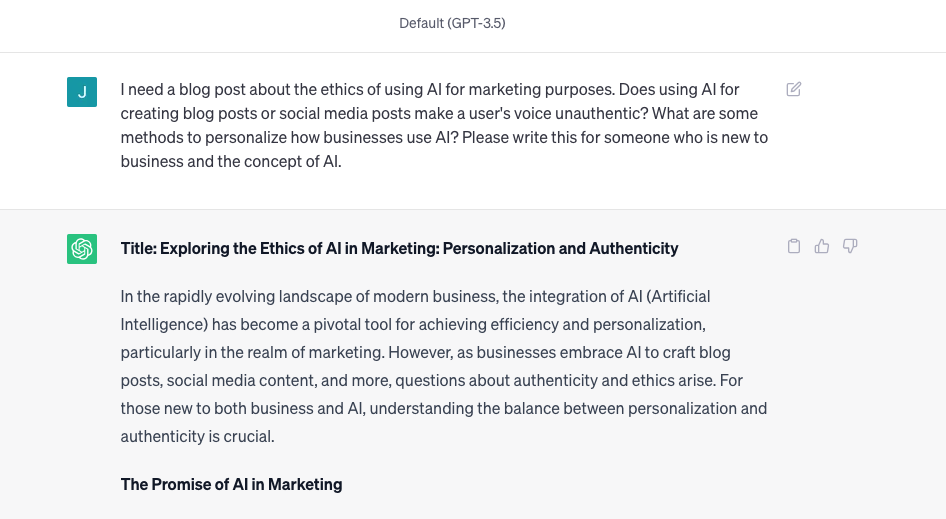Can you call yourself tech-savvy if you’ve never dabbled with AI?
The integration of AI (Artificial Intelligence) has become a pivotal tool for achieving efficiency and personalization in the next era of digital marketing.
However, as more businesses embrace AI to craft blog posts, social media content, and more, questions about authenticity and ethics arise.
For those new to both business and AI, understanding the balance between personalization and authenticity is crucial.

The Promise of AI in Marketing
AI offers businesses the ability to process and analyze vast amounts of data quickly, enabling them to tailor content to specific audiences, predict consumer behavior, and optimize marketing strategies. This level of personalization can lead to more engaging interactions with customers, potentially resulting in higher conversion rates and improved customer satisfaction. But where does the line between personalization and authenticity blur?
Unmasking Authenticity
One concern that surfaces when using AI to generate content is the authenticity of the voice behind the message. When businesses employ AI to write blog posts or social media content, the tone, style, and even the core message may appear canned or formulaic. This can create an impression of inauthenticity, making customers feel like they’re engaging with a faceless machine rather than a genuine human being.
Striking a Balance: Methods for Ethical AI Personalization
- Human-AI Collaboration: Rather than fully automating content creation, businesses can adopt a collaborative approach. AI can assist in generating drafts, which human writers can then refine, infusing their unique perspectives and creativity. This preserves authenticity while leveraging AI’s efficiency.
- Data-Driven Insights: AI can analyze customer data to identify patterns and preferences. Businesses can use these insights to tailor content that resonates with their audience’s interests, maintaining relevance and authenticity.
- Customizable AI Models: Some AI platforms allow businesses to fine-tune their models, training them to emulate a specific writing style or tone. This can help maintain consistency with the brand’s voice, while still benefiting from AI assistance.
- Transparency: Businesses should be open about their use of AI in content creation. Being transparent with customers about the role of AI in generating content can foster trust and authenticity.
- Human Review and Editing: All AI-generated content should undergo human review. This ensures that the final output aligns with the brand’s values and messaging, adding that human touch.
- Feedback Loop: Continuously gather feedback from customers about the content. This loop of feedback and adjustment ensures that the content remains authentic and resonates with the audience.
Ethical Considerations
When venturing into AI-powered marketing, businesses must also consider the ethical implications. Data privacy, bias in AI algorithms, and the potential displacement of human jobs are significant concerns that need to be addressed responsibly.
In conclusion, AI can be a powerful tool for businesses, enhancing personalization and optimizing marketing efforts. However, the challenge lies in maintaining authenticity while utilizing AI-generated content. By embracing collaboration, customization, transparency, and ethical considerations, businesses can strike a balance that respects both the potential of AI and the authenticity of their brand’s voice. With the right approach, AI can empower businesses to engage with their audience effectively, creating a win-win scenario for all parties involved.




